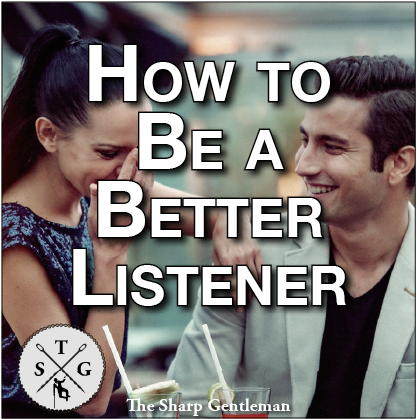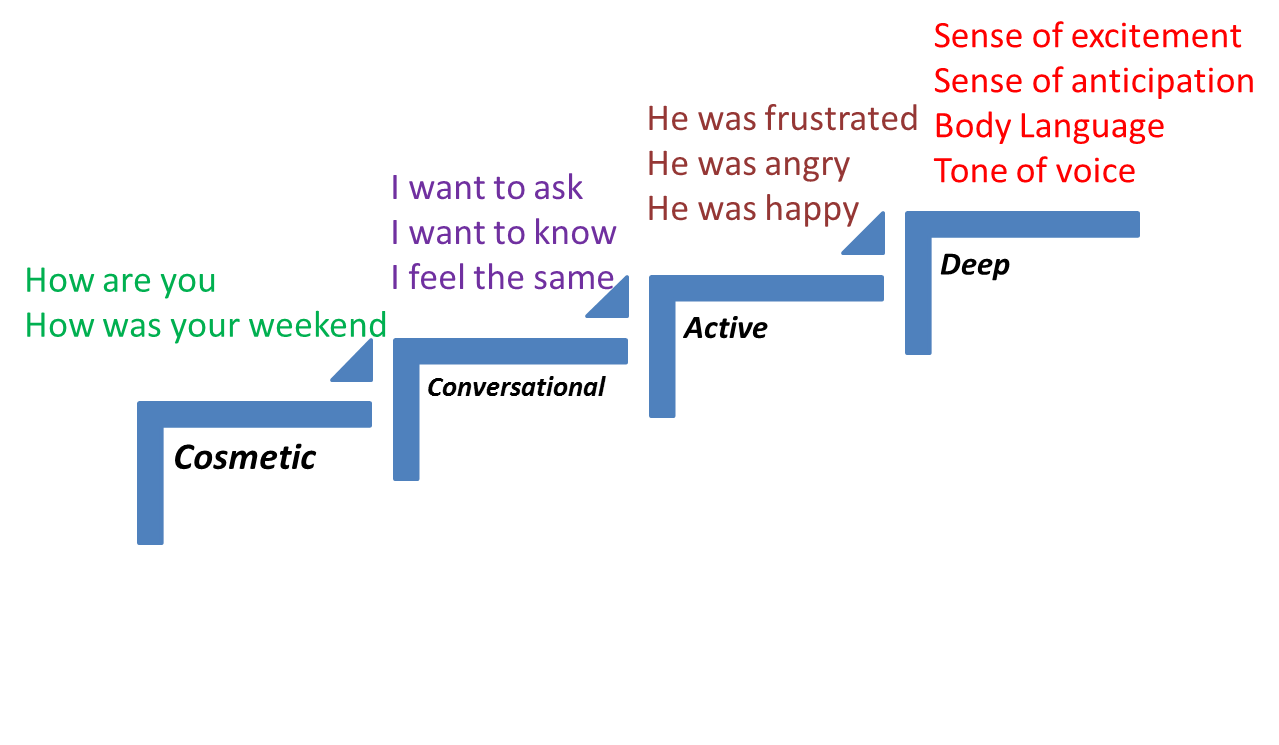PODCAST: How to Be a Better Listener

 One of the most misused superpowers a man can have is the power to listen deeply. Millions of self-proclaimed “good listeners” are actually just listening well enough to keep a conversation going in his or her direction. Genuine listeners hear what isn’t being said, connect more deeply with their partner, and create a pathway for creative collaboration and power.
One of the most misused superpowers a man can have is the power to listen deeply. Millions of self-proclaimed “good listeners” are actually just listening well enough to keep a conversation going in his or her direction. Genuine listeners hear what isn’t being said, connect more deeply with their partner, and create a pathway for creative collaboration and power.
This is incredibly important for any man trying to better himself and the world around him. Gentlemen, this is you (at least it should be). When you learn to genuinely listen at a deeper and more active level, you touch a place in those you communicate with and it allows doors to open to more – more feelings, more opportunities, more connections, and more fulfillment.
It’s not about eye contact anymore, gents. You can stare into the other person’s eyes all you want, but it may not make a lick of difference in how you listen, connect, relate, or remember what was discussed. Let’s put that myth to bed right now. My years of relationship coaching and hypnotherapy taught me a lot of incredible skills, but far and away, the best skill is true listening. I want to help you be a better gentleman and show you how to be a better listener, so let’s get right down to it.
In this podcast, I’ll introduce you to the different levels of listening and give you examples in each of them so you get a better understand of each and how you can move into deeper, more active levels immediately. [remember to Subscribe Here]
Show Notes:
There are four main levels in the listening realm –I’m not counting the non-listening level called “ignoring / avoiding” that you’ll occasionally see when you google listening levels. If you’re not listening, it’s not really a listening level, now is it? Right. The actual levels are these:
- Cosmetic/Superficial
- Conversational
- Active
- Deep
Cosmetic / Superficial Listening
On this level, we’re really talking for the sake of making noise. We’re not even remotely interested in any responses. This level contains passing phrases and grunts. Literally, grunts. Cosmetic listening is where we ask each other how we’re doing, what’s up, etc. Whatever the other person says is not important; rather, a simple sound of acknowledgement is all we’re really looking for.
“Hey Jake. How go things?”
“Good / Bad / Interesting / Terrible / Excellent” – This conversation is done here.
Conversational Listening
This is the listening level where 80% of the population hangs out. In conversational listening, you will probably make eye contact, have an active interest in what you and your partner are talking about, and you may even have decent body language. Hell, you might even remember what they said after you leave! But… at this level you are actually thinking about what you’re going to say next while you listen.
If you’re sitting at lunch with a friend and he begins to tell you about his trip to Colorado and the brewery tours he enjoyed, your mind is running through al the different things you could say about the brewery tours you have taken, or that time you went on a trip –you’re making eye contact and “listening” to him, but you’re actually in your own head, thinking of the next thing you are going to say.
I don’t want you to feel bad about being on this level most often. Instead, I want you to be aware of it so you can hopefully get better and move into a deeper level. When you recognize yourself thinking about yourself while listening to someone else, focus more on them and their story and less about you. It takes practice, but you’ll get there.

Active Listening
In this level, you begin to connect more with the person, their perspective, their emotions, and your own empathy. In active listening, you’re present to the person and message coming at you. You’re out of your head, and completely absorbed in what’s happening. You pick up on the tone of voice, the emotions conveyed, the words and meanings themselves, and are able to articulate great feedback and following questions from them.
This is where good listeners are truly comfortable. This is where those you communicate with walk away from your conversations genuinely feeling heard and understood. In negotiating, it’s always best to be able to read your opponent, right? Listening at this level is an excellent way to read someone. You can ask questions, receive answers and the feelings, tone, and the inflection used. Armed with those other details, you can more effectively discern where the conversation is going, and where it can go instead. At this level, you can ask more powerful questions and show off your listening and empathy skills.
Deep Listening
This is my favorite level because it’s all about the things not said. Deep listening is about the tone of the room, the mood, or the energy of the area around you. While it may sound a little new-agey, we have all been in a room that suddenly “feels” different after someone says something profound (profoundly good or bad).
At this level, you are using your body language to convey your interest, your’e reading their body language and adjusting to match, and you’re feeling the excitement, sadness, anxiety, exhilaration radiating during the conversation. When you can articulate that unspoken vibe, you reveal a deeper sense of yourself to the other person and show how much you’re truly listening.
So how to be a better listener…
When you’re listening to someone, stay out of your head and your own thoughts. Focus on what they’re saying, feeling, sharing (emotionally), and the vibe you feel when they’re telling their story. Ask more simple and powerful questions to draw more story out of them. Questions that are open-ended (do not end in yes or no) are always a great tool to expand more conversation. Match the other person’s energy and enthusiasm when you respond. If they’re excited, you can gain traction by matching their excitement (without coming off as patronizing).
When you make it more about what they are saying, what they are sharing, and what they are feeling when they share, you will easily exercise your listening superpower and show the world how much of a great listener you truly are.
What do you think about listening and being a “good” listener?
What ways to try to stay present in conversation and let the other person know you’re listening?
Let me know! And remember to SUBSCRIBE to the podcast!




